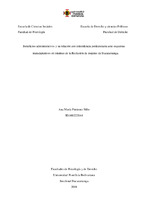Beneficios Administrativos y su relación con reincidencia penitenciaria ante esquemas maladaptativos en internas de la Reclusión de Mujeres de Bucaramanga
Fecha
2018Autor
Pimiento Niño, Ana María
Director/Asesor
Director. Becerra Mojica, Luis Alejandro
Tipo de contenido
Trabajo de grado
Citación
Metadatos
Mostrar el registro completo del ítemDocumentos PDF
Resumen
Introducción: La reincidencia penitenciaria constituye un fenómeno de alto impacto en la interacción social cuyas consecuencias afectan de manera negativa tanto al estado colombiano como al individuo que viola la ley penal. El objetivo de la investigación fue establecer si las mujeres que hablan o no obtenidos beneficios administrativos, habían reincidido en el actuar delictivo tornando como elemento de comparación la presencia de esquemas maladaptativos. Ello con el fin de facilitar una comprensión psicológica y jurídica del mencionado fenómeno, suscitando elementos científicos que fundamenten el rediseño de la política criminal y penitenciaria. Metodología: Estudio de enfoque cuantitativo bajo un diseño no experimental con alcance correlacional de corte transeccional. La muestra, estuvo constituida por 25 mujeres reincidentes en edades comprendidas entre los 20 y 60 años, segmentados en dos grupos, quienes habían obtenido beneficios administrativos (n=8); y quienes no (n=17). Los instrumentos empleados fueron el cuestionario de Esquemas de Young (YSQ — SF) y el cuestionario sociodemográfico para evaluar riesgo de reincidencia. Resultados: Si bien se pudo constatar que no había relación entre haber obtenido beneficios administrativos y la reincidencia penitenciaria, se identificaron aspectos determinantes en la presencia de esquemas maladaptativos relativos a Estándares inflexibles, Inhibición emocional y Grandiosidad en ambos grupos; al igual que la presencia de variables que la literatura han relacionado con riesgo de reincidencia en mujeres infractoras de la ley; y el posible móvil de los beneficios administrativos dentro del marco del tratamiento penitenciario progresivo que concibe un tipo de régimen abierto Introduction: Penitentiary recidivism is a social phenomenon that has a negative effect on the state, society and people who commit any kind of crime. One way to approach it, from psychological and legal understanding, is knowing if women who have gotten prison furloughs during their punishment have committed another crime after get their freedom, taking into account the presence of maladaptive schemes in inmates as a special cognitive structure. In this way, is important to asses each factor that can be associated with this phenomenon in order to redesign our criminal and penitentiary policy. Therefore, the objective of this researching was to know if there was any relationship between have gotten any prison furloughs or not, and recidivism, in women inmates who have different maladaptive schemes at Bucaramanga's prison. Methodology: Study of quantitative approach, under a non-experimental cross-sectional design, with an correlational scope. The sample consisted of 25 women recidivist aged between 20 and 60 years old, segmented into two groups, those who had gotten prision furloughs (n=8) and the other ones who had not gotten that(n=17). The questionnaires used were Young Schema Questionnaire Long Form — Second edition (YSQ), and the questionnaire to assess the risk of recidivism. Results: Although there was no relationship between have gotten any prision furloughs and recidivism, some maladaptative schemes were identified in both groups, they are inflexible standards, emotional Inhibition, and Grandiosity, in addition, there was identified several variables which are related to recidivism risk according to scientific literature, and the purpose of prison furloughs within progressive penitentiary treatment, which as part of open penitentiary regime.
Palabra/s clave
Presos
Reincidentes
Mujeres
Ganancias
Colecciones
- Trabajos de grado [6691]
El ítem tiene asociados los siguientes ficheros de licencia:


